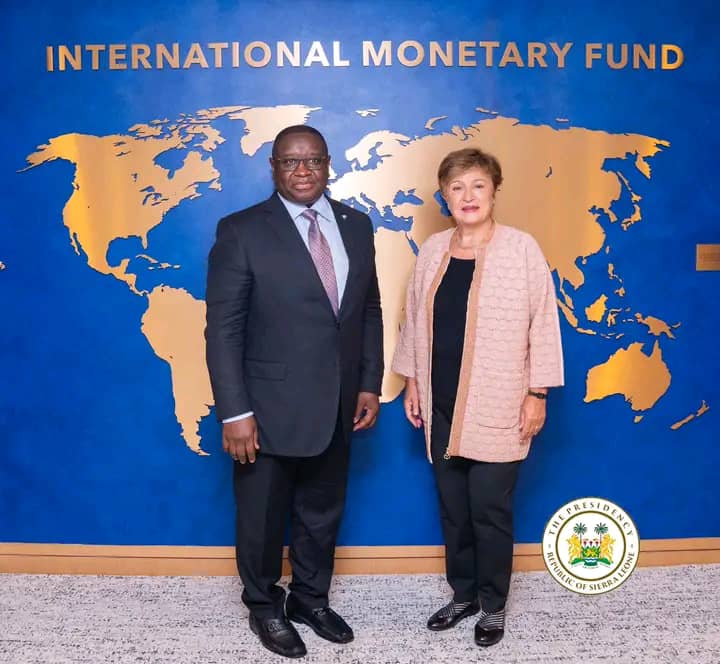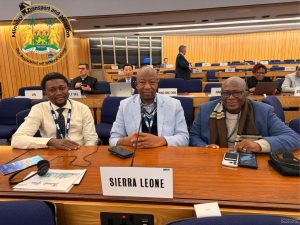IMF and Sierra Leone Strengthen Ties President Bio Advocates for African Inclusion in Global Decisions

President Bio of the Republic of Sierra Leone, engaged in a landmark meeting with Kristalina Georgieva, the Managing Director of the International Monetary Fund (IMF), focusing on pivotal global economic issues. This high-level discussion underscored the critical importance of development cooperation, financial inclusivity, and fortifying international partnerships to promote sustainable economic growth, especially within developing nations.
The meeting between President Bio and Managing Director Georgieva comes at a crucial time for Sierra Leone, as the country continues its economic recovery from the compounded effects of global crises, including the COVID-19 pandemic and global inflationary pressures. For President Bio, the dialogue offered an opportunity to secure continued support from the IMF, a key international partner, to stabilize and rebuild Sierra Leone’s economy, while also addressing structural challenges such as poverty reduction, fiscal responsibility, and inclusive growth.
Kristalina Georgieva, in turn, acknowledged Sierra Leone’s persistent efforts to implement key economic reforms and maintain fiscal discipline, even amidst difficult global conditions. She commended President Bio’s leadership and Sierra Leone’s resilience in navigating economic challenges, while affirming the IMF’s commitment to supporting the country’s economic transformation.
A major theme in the conversation was the significance of sustained development cooperation. Both leaders emphasized that amid the complexities of the current global economic environment, it is essential for developing nations like Sierra Leone to have robust partnerships with international financial institutions such as the IMF. These partnerships ensure not only the provision of financial support but also the transfer of knowledge and technical expertise, which are critical for sustainable economic growth and development.
President Bio highlighted Sierra Leone’s ongoing need for international cooperation, particularly in areas like infrastructure development, education, and health. As the country continues its post-pandemic recovery, it faces the challenge of modernizing its economy and addressing long-standing social issues such as unemployment, especially among the youth.
Managing Director Georgieva reiterated that the IMF remains committed to supporting nations like Sierra Leone through tailored financial assistance programs, debt management strategies, and capacity-building initiatives. She emphasized that the IMF is not only a financial partner but also a strategic ally in helping nations implement policies that drive sustainable development and improve livelihoods.
One of the critical issues raised during the discussion was the need for increased representation of sub-Saharan African countries within global financial institutions. Both President Bio and Managing Director Georgieva expressed their shared commitment to ensuring that the voices of African nations are better reflected in the IMF’s decision-making processes.
Sub-Saharan Africa is home to some of the fastest-growing economies, yet these countries often face structural barriers to growth, exacerbated by limited representation in global financial governance. President Bio advocated for a stronger voice for the region, stressing that only through inclusive decision-making can the unique challenges faced by African economies—such as climate change, debt burdens, and the need for infrastructure development—be adequately addressed.
Managing Director Georgieva agreed, noting that the IMF has made strides in increasing the participation of African countries in key policy discussions. However, she emphasized the need to continue this progress by ensuring that African nations have a more substantial role in shaping global economic policies, particularly as they pertain to development financing, debt relief, and access to international markets.
For Sierra Leone, the support of international financial institutions like the IMF has been crucial in driving forward key economic reforms. Since the election of President Bio, the government has been working on improving governance, combating corruption, and investing in human capital through initiatives such as the Free Quality Education Program. These reforms have been essential in stabilizing the economy and setting the foundation for long-term growth.
During the meeting, President Bio outlined his government’s vision for the next phase of Sierra Leone’s economic transformation, which includes a focus on diversifying the economy, promoting private sector growth, and improving the country’s fiscal position. He emphasized that with the right support, Sierra Leone has the potential to become a regional leader in sectors such as agriculture, tourism, and technology.
Managing Director Georgieva commended Sierra Leone’s progress but noted that significant challenges remain, particularly in managing the country’s debt levels and ensuring macroeconomic stability. She assured President Bio that the IMF would continue to provide technical assistance to help the country strengthen its economic frameworks, manage its public debt, and attract foreign investment.
As part of the broader discussion, both leaders also touched on the pressing global economic challenges that developing countries face, including rising inflation, climate change, and the geopolitical tensions that have disrupted global supply chains. They emphasized the need for a coordinated international response to these challenges, particularly in ensuring that developing nations are not left behind in global recovery efforts.
President Bio and Managing Director Georgieva acknowledged that while the global economy has shown signs of recovery from the pandemic, many developing nations are still grappling with the aftershocks, including food insecurity, rising energy costs, and limited access to financing. They called for a renewed commitment from the international community to support vulnerable countries and promote a more equitable recovery.
The meeting between President Bio and Kristalina Georgieva ended on a note of optimism and shared purpose. Both leaders expressed their commitment to fostering inclusive economic growth, reducing inequality, and building more resilient economies that can withstand future global shocks.
For Sierra Leone, the partnership with the IMF represents a critical component of its long-term development strategy. As the country continues to implement its economic reforms, the support of international partners will be key to achieving sustainable growth and improving the livelihoods of all Sierra Leoneans.
Managing Director Georgieva reaffirmed the IMF’s pledge to work alongside Sierra Leone and other developing nations to ensure that they have the tools and resources needed to navigate the complexities of the global economy. She also reiterated the IMF’s commitment to promoting financial inclusivity and supporting efforts to give developing nations a greater voice in global economic decision-making.
The meeting between President Bio and Managing Director Georgieva underscores the importance of strong international partnerships in today’s interconnected world. As Sierra Leone looks ahead to its future development, the continued collaboration with institutions like the IMF will play a crucial role in shaping the country’s economic trajectory and ensuring that it can achieve its ambitious goals for growth and prosperity.
This momentous meeting marks a key step in strengthening Sierra Leone’s ties with the international community and highlights the importance of global cooperation in addressing the challenges and opportunities of the 21st century.





